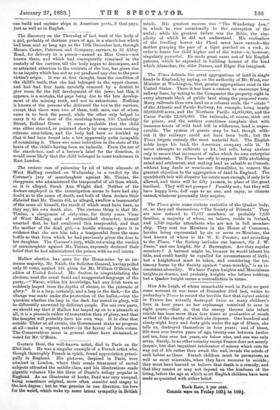The Times defends the great aggregations of land in single hands
in England, by saying, on the authority of Mr. West, our Minister at Washington, that greater aggregations exist in the United States. There it has been a custom to encourage long railway lines, by voting to the Companies the property-right in every alternate block of public land along the proposed route. Many railroads thus own land on a colossal scale, the " estate " of the Atlantic and Pacific Railway, for example, being nearly 50,000,000 acres, and the Northern Pacific 42,000,000, and the Union Pacific 12,000,000. The railroads, of course, stick out for prices; and the settlers sometimes complain that with immense tracts of wild land left in wilderness, land is unpro- curable. The system of grants may be bad, though with- out it the railways could not have been built; but the Times forgets entirely the most material fact. The English noble keeps his land, the American company sells it It never attempts to cultivate or let, but sells, being anxious only to secure that increment of value which its own enterprise has conferred. The Times has only to support Bills abolishing entail and settlement, and making land as saleable as Consols, without long deeds or wearisome formalities, to remove the greatest objection to the aggregation of land in England. The spendthrift heir will disperse his estate soon enough, if only he is allowed, and there will be fifty yeomen, in place of the great landlord. They will not prosper P Possibly not; but they will have happy lives, doff caps to no one, and enjoy, as citizens cannot, whatever personalty they acquire.






































 Previous page
Previous page